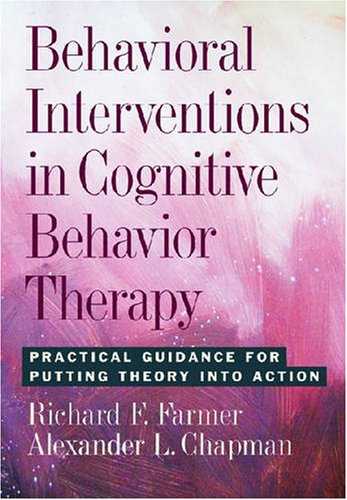Synopsis
Cognitive behavior therapy (CBT) dominates lists of evidence-based treatments and is increasingly used by front-line clinicians. Behavioral methods, such as self-monitoring, behavioral activation, behavioral experiments, exposure therapy, and skills training, are core features of CBT. In fact, some studies suggest that these are among the primary active ingredients in CBT.
In this detailed, step-by-step guide, Farmer and Chapman show readers how to put behavioral theory and science into action. They discuss case formulation and treatment planning, core behavioral intervention strategies, and innovative approaches, such as acceptance, mindfulness, and a behavioral approach to cognition. Flexible and useful across different client populations, the behavioral interventions described here leave room for therapists to be respectful of their clients' unique needs and individuality. Using case examples, the authors demonstrate how to generate case formulations, apply interventions, respond to common problems, navigate termination, and help clients to generalize treatment gains beyond therapy. The behavioral framework they describe is practical and accessible to clinicians and students with varying degrees of behavioral training.
About the Author
Richard F. Farmer, PhD, is currently a researcher at Oregon Research Institute in Eugene. After completing a clinical internship at Duke University Medical Center in Durham, North Carolina, and earning a doctorate degree in clinical psychology from the University of North Carolina at Greensboro, he served as an associate professor of psychology at Idaho State University in Pocatello and as a senior lecturer in psychology at the University of Canterbury in Christchurch, New Zealand. Dr. Farmer's main areas of interest include behavior therapy, behavioral and personality assessment, depression, personality disorders, impulsivity, eating disorders, and experiential avoidance.
Alexander L. Chapman, PhD, is currently an assistant professor in psychology at Simon Fraser University in Burnaby, British Columbia, Canada. Dr. Chapman received his doctorate degree in clinical psychology from Idaho State University in Pocatello in 2003, after completing his clinical internship at Duke University Medical Center in Durham, North Carolina. He then completed a postdoctoral fellowship with Marsha Linehan at the University of Washington in Seattle. His research focuses on borderline personality disorder, dialectical behavior therapy, emotion regulation, self-harm, and impulsivity, and he has published numerous articles and book chapters on these topics. Dr. Chapman is also cofounder of the Dialectical Behaviour Therapy Centre of Vancouver in British Columbia, Canada.
"About this title" may belong to another edition of this title.
